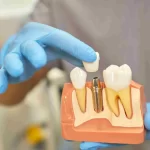Dental implants are the false teeth that are surgically placed in the human mouth. These implants act and feel like real teeth; therefore, they demand the same type of care. Dentists or family dentists advise their patients to take care of their dental implants so they can last a lifetime.
If dental implants are not taken proper care of, they can lead to sore gums and tooth decay. Therefore, it is important to take care of dental implants (and your real teeth). Follow these tips for a healthy mouth and contact your family dentist for further assistance.
The Basics
It has been established that caring for dental implants is like taking care of natural teeth, which means brushing, flossing, and the dental cleanings ALL need to be done. Dentists recommend having regular checkups and additional cleaning procedures to do at home.
Taking Care
Dental implants should be cleaned and kept plaque-free all the time. Just like real teeth, flossing and brushing must be done 2 times a day. Make sure you are cleaning your teeth well after meals, as this is extremely important. Cleaning well would mean gently brushing your teeth and putting in extra effort to clean all the sides of the dental implant.
Here are a few things that will ensure oral hygiene:
- Soft, small, manual toothbrush or an electric toothbrush (it must have small bristles)
- Tartar-control, low-abrasive toothpaste
- Flossing around the abutments so they are cleaned on all sides
Here are the supplies your dentist or family dentist may recommend:
- Antimicrobial mouthwashes
- Specialized dental toothbrushes or other tools to remove the plaque that may be stuck between or on the sides of the teeth
- Tablets that may remove the plaque in your mouth
Individuals, who get dental implants, must be committed to a dental hygiene regime along with regular dentist or family dentist visits. Dentists or family dentists recommend seeing dentists every 3-6 months for examinations and cleaning.
Every year, dental implants need to be examined through an X-ray to see if everything is right.
What Happens if Care is Not Given
Dental implants can become problematic if the correct care is not given. The earliest signs of these implant problems are bleeding, known as mucositis. Luckily, researchers say that if this symptom is addressed early, there are successful treatments to stop it. However, if damage gets to the bone, it can cause severe bone damage and this cannot be reversed. If the problem gets out of hand, it can lead to the removal of the dental implant.
What Dentists and Family Dentists Look For
All dentists check and compare annual X-rays, check for any looseness, check bites and all the metal posts that the artificial teeth are attached to. This is why going to the dentist every 3-6 months is crucial.


















